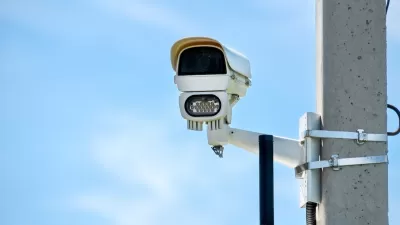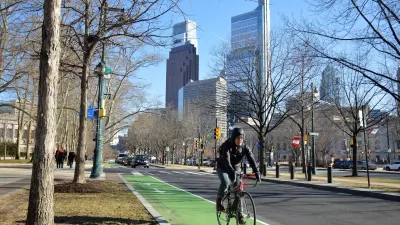When it comes to enforcing laws like jaywalking, strictly imposed tickets and fines motivate people to change their behavior. John Cichowski discusses whether light-hearted, even humorous, suggestions can be as effective as heavy-handed prosecution.
After four pedestrian deaths in Fort Lee, New Jersey, the city's jaywalking law was strictly enforced by Mayor Mark Sokolich and his police chief. The campaign provided fodder for Jay Leno, and the question arose, "Might there be a less politically offensive way to get the jaywalking message across? Maybe something laced with talk show humor?"
In Philadelphia, officials believe they can rely on wit rather than threat to convince people to stop jaywalking. Starting in late February, signs will be put up that give advice to pedestrians along the lines of "Cross smart. You're fast, but cars are faster" and to drivers, "Thank you for not running pedestrians over. It's road safety, not rocket science."
These messages might work, says Cichowski, "But here's the rub. Humor, whether parody or outright sarcasm, can be dangerous when dealing with road crashes that kill more than 32,000 people nationally each year." Fort Lee has experienced no pedestrian deaths since jaywalkers were threatened with tickets, which shows that traditional methods are effective. However, what Philadelphia may have found is "a way to walk a tightrope between educating violators and threatening them with enforcement."
FULL STORY: Road Warrior: Can humor reduce jaywalking?

Manufactured Crisis: Losing the Nation’s Largest Source of Unsubsidized Affordable Housing
Manufactured housing communities have long been an affordable housing option for millions of people living in the U.S., but that affordability is disappearing rapidly. How did we get here?

Americans May Be Stuck — But Why?
Americans are moving a lot less than they once did, and that is a problem. While Yoni Applebaum, in his highly-publicized article Stuck, gets the reasons badly wrong, it's still important to ask: why are we moving so much less than before?

Using Old Oil and Gas Wells for Green Energy Storage
Penn State researchers have found that repurposing abandoned oil and gas wells for geothermal-assisted compressed-air energy storage can boost efficiency, reduce environmental risks, and support clean energy and job transitions.

Poorest NYC Neighborhoods Pay Price for Delivery Boom
The rise of ‘last-mile’ e-commerce warehouses — and their attendant truck traffic and air pollution — is disproportionately impacting the most historically disadvantaged parts of the city.

Greening Oakland’s School Grounds
With help from community partners like the Trust for Public Land, Oakland Unified School District is turning barren, asphalt-covered schoolyards into vibrant, green spaces that support outdoor learning, play, and student well-being.

California Governor Suspends CEQA Reviews for Utilities in Fire Areas
Utility restoration efforts in areas affected by the January wildfires in Los Angeles will be exempt from environmental regulations to speed up the rebuilding of essential infrastructure.
Urban Design for Planners 1: Software Tools
This six-course series explores essential urban design concepts using open source software and equips planners with the tools they need to participate fully in the urban design process.
Planning for Universal Design
Learn the tools for implementing Universal Design in planning regulations.
Heyer Gruel & Associates PA
City of Moreno Valley
Institute for Housing and Urban Development Studies (IHS)
City of Grandview
Harvard GSD Executive Education
Salt Lake City
NYU Wagner Graduate School of Public Service
City of Cambridge, Maryland





























